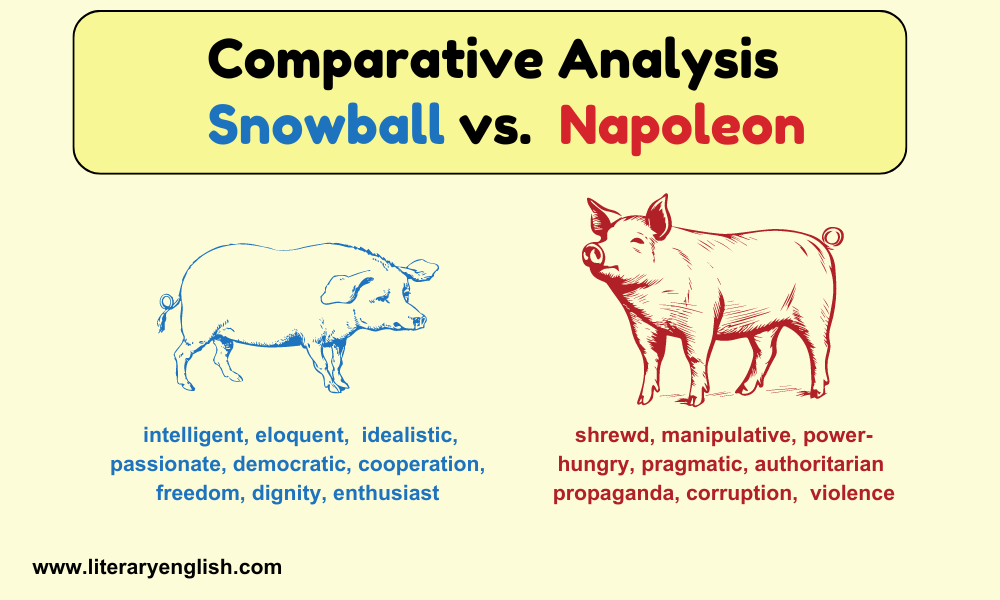In George Orwell’s “Animal Farm,” Snowball and Napoleon are two prominent pigs who emerge as leaders following the rebellion against Mr. Jones. Despite their shared goal of creating a society free from human oppression, Snowball and Napoleon possess contrasting personalities, leadership styles, and visions for the future of Animal Farm. Here’s a comparative character analysis of Snowball and Napoleon:
Personality: Snowball vs. Napoleon
Snowball is depicted as an intelligent, eloquent, and idealistic pig. He is passionate about the principles of Animalism and envisions a society based on equality, education, and progress. Snowball is known for his enthusiasm, charisma, and ability to inspire others with his speeches and ideas.
In contrast, Napoleon is portrayed as a shrewd, manipulative, and power-hungry pig. He is pragmatic and calculating, always prioritizing his own interests over the welfare of others. Unlike Snowball, Napoleon lacks idealism and charisma, relying instead on fear, coercion, and deceit to maintain control.
Leadership Qualities
Snowball adopts a democratic leadership style, advocating for the participation and empowerment of all animals on the farm. He proposes initiatives such as the construction of the windmill to improve living conditions and increase productivity. Snowball emphasizes education and innovation, seeking to empower the animals through knowledge and technology.
Napoleon, on the other hand, employs an authoritarian leadership style, consolidating power and suppressing dissent through fear and intimidation. He uses propaganda, censorship, and violence to maintain control over the farm, eliminating anyone who opposes his rule. Unlike Snowball, Napoleon prioritizes his own comfort and luxury, hoarding resources and privileges for himself and his inner circle.
Contradictory Visions
Snowball’s vision for Animal Farm is characterized by progress, cooperation, and collective prosperity. He believes in the potential of the animals to govern themselves and advocates for social and economic equality. Snowball dreams of transforming Animal Farm into a thriving utopia, where all animals enjoy freedom, dignity, and opportunity.
In contrast, Napoleon’s vision for the farm is driven by self-interest, greed, and domination. He seeks absolute power and control, viewing the other animals as mere tools to serve his own ends. Napoleon prioritizes the expansion of his own authority and the accumulation of wealth and privilege, even if it means sacrificing the welfare of his fellow animals.
Fate and Legacy of Snowball and Napoleon
Despite his intelligence and good intentions, Snowball is ultimately driven into exile by Napoleon’s machinations. He becomes a scapegoat for the farm’s problems and is portrayed as a traitor and enemy of the revolution. Snowball’s legacy is one of idealism and martyrdom, as he represents the noble aspirations and sacrifices of those who strive for a better world.
Napoleon’s reign is marked by corruption, oppression, and betrayal. He becomes increasingly tyrannical and despotic, ruling Animal Farm with an iron fist and betraying the principles of the revolution. Napoleon’s legacy is one of tyranny and hypocrisy, as he embodies the dangers of unchecked power and the perversion of revolutionary ideals.
Conclusion
In summary, Snowball and Napoleon are polar opposites in terms of personality, leadership style, and vision for the future of Animal Farm. While Snowball represents idealism, democracy, and progress, Napoleon embodies cynicism, authoritarianism, and self-interest. Their rivalry and eventual conflict serve as a central theme in “Animal Farm,” illustrating the complexities of power and the consequences of betrayal in the pursuit of revolution.
Related Posts from Animal Farm
- Animal Farm in Historical Context
- Plot Overview of Animal Farm
- Introduction To Animal Characters
- Chapter-Wise Summary
- Symbolism in Animal Farm
- Principal Theme of Animal Farm
- Animal Farm as an Allegory
- Character Analysis Of Old Major
- Symbolic Significance of Bleating Sheep
- The Song “Beasts Of England” In George Orwell’s
